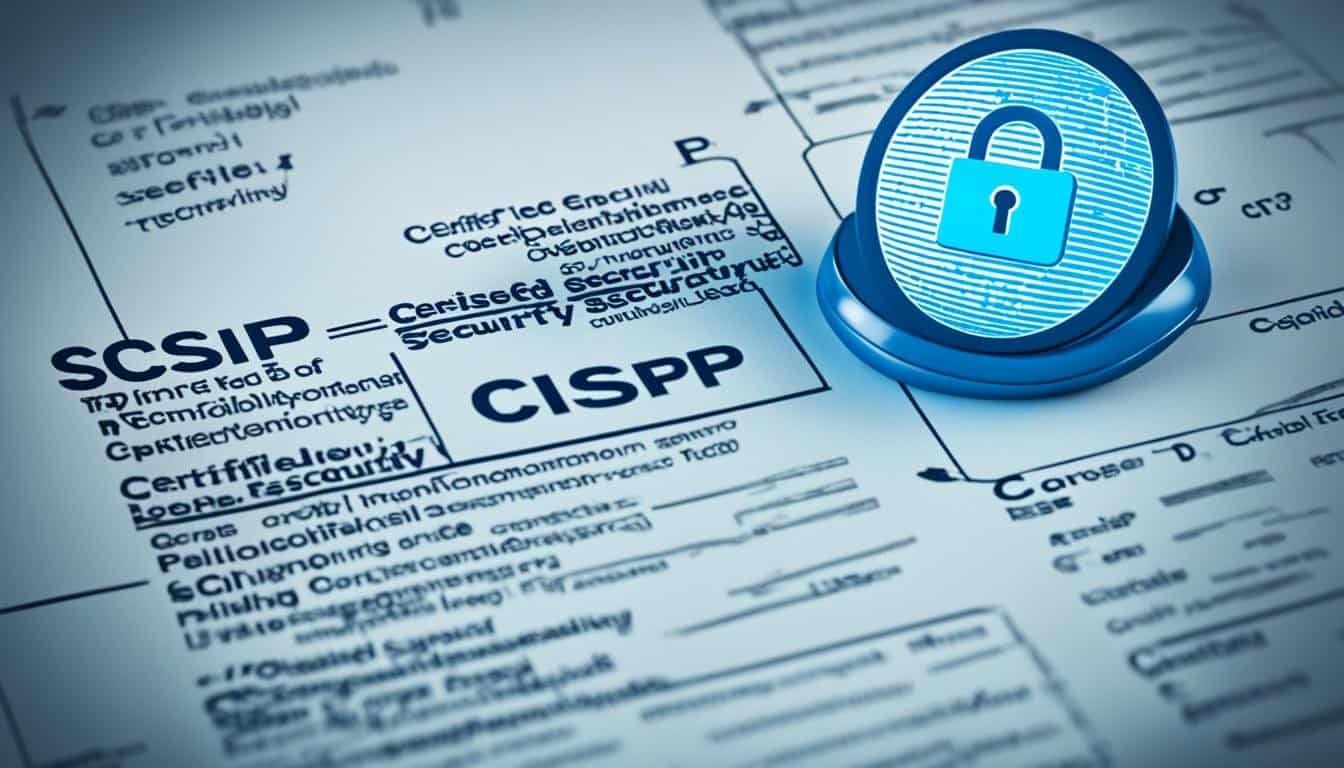Certified Information Systems Security Professional (CISSP)
Did you know that cybersecurity breaches cost businesses an estimated $2.9 million per instance on average?
In today’s digital landscape, protecting sensitive information has become crucial for organizations across industries. As cyber threats continue to evolve and become more sophisticated, the demand for skilled information security professionals has skyrocketed. And one certification that stands out among the rest is the Certified Information Systems Security Professional (CISSP).
The CISSP certification is recognized globally as a premier cybersecurity certification, validating the expertise of professionals in designing, implementing, and managing robust cybersecurity programs. This highly respected certification offers a wide range of benefits for aspiring and seasoned information security professionals alike.
In this comprehensive guide, we will explore the world of CISSP, including the exam requirements, the domains covered, the benefits of certification, and the various career paths that it opens up. So, whether you’re an information security professional looking to enhance your skills or an aspiring cybersecurity enthusiast aiming to break into the industry, this article will equip you with the knowledge you need to secure your future in cybersecurity.
CISSP Exam and Requirements
The CISSP exam is a comprehensive test that evaluates candidates’ knowledge and skills in various domains related to information security. It consists of eight domains, each covering a specific area of expertise:
- Security and Risk Management
- Asset Security
- Security Architecture and Engineering
- Communication and Network Security
- Identity and Access Management (IAM)
- Security Assessment and Testing
- Security Operations
- Software Development Security
To be eligible for the CISSP certification, candidates must meet certain requirements. One of the key requirements is having a minimum of five years of cumulative, paid work experience in one or more of the eight domains. This experience must be directly related to information security.
However, candidates who do not meet the minimum work experience requirement may still be eligible by fulfilling other criteria. These include having a four-year college degree or an approved credential from the CISSP Professional Development Institute. Additionally, candidates with relevant certifications, such as CompTIA Security+, can apply for education waivers.
It’s important to note that the CISSP exam is rigorous and requires thorough preparation. Candidates are encouraged to study the domains extensively and use reputable study materials and resources. By preparing effectively, candidates can increase their chances of passing the exam and obtaining the CISSP certification.
For more information on the CISSP exam and requirements, refer to the following sources:
Source 1: [Insert Source 1]
Source 2: [Insert Source 2]
| Domain | Description |
|---|---|
| Security and Risk Management | Focuses on the management of information security and risk |
| Asset Security | Covers the protection of organizational assets |
| Security Architecture and Engineering | Addresses the design and implementation of secure systems |
| Communication and Network Security | Deals with the protection of network infrastructure and communication channels |
| Identity and Access Management (IAM) | Focuses on the management of user identities and access to resources |
| Security Assessment and Testing | Covers the evaluation and testing of security controls |
| Security Operations | Addresses the implementation and management of security operations |
| Software Development Security | Focusses on integrating security throughout the software development lifecycle |
Benefits of CISSP Certification
Obtaining the Certified Information Systems Security Professional (CISSP) certification brings a multitude of benefits to professionals in the field of information security. This prestigious certification equips individuals with the necessary skills and knowledge to excel in their careers. Here are some key advantages:
- Increased Career Opportunities: CISSP-certified professionals have access to a wide range of lucrative career paths. With the constant demand for cybersecurity expertise, CISSP holders are highly sought after by employers in various industries. Whether it’s in government, finance, healthcare, or consulting, the CISSP certification opens doors to exciting and rewarding job opportunities.
- Higher Earning Potential: CISSP certification is often associated with increased earning potential. Professionals holding this certification demonstrate their mastery of core cybersecurity principles, making them valuable assets to organizations. As a result, CISSP-certified individuals can command higher salaries compared to their non-certified peers.
- Access to Exclusive Resources: CISSP certification grants access to a vibrant community of cybersecurity professionals. This community provides valuable networking opportunities, enabling individuals to connect with like-minded experts, share best practices, and stay up-to-date with the latest industry trends. CISSP-certified professionals also gain access to exclusive resources such as research papers, case studies, and online forums dedicated to information security.
- Continued Professional Development: Maintaining the CISSP certification requires professionals to engage in ongoing professional development activities. This commitment ensures that CISSP holders stay current with emerging threats, technologies, and best practices in the ever-evolving field of cybersecurity. Continuous learning and growth contribute to enhanced job performance and increased credibility as a cybersecurity professional.
The CISSP certification offers numerous benefits, including expanded career opportunities, higher earning potential, access to exclusive resources, and continuous professional development. It is a valuable asset for individuals aiming to succeed in the fast-paced and competitive field of information security.
| Benefit | Explanation |
|---|---|
| Increased Career Opportunities | Access to a wide range of job roles in different industries |
| Higher Earning Potential | Ability to command higher salaries compared to non-certified professionals |
| Access to Exclusive Resources | Networking opportunities and access to research papers and online forums |
| Continued Professional Development | Ongoing learning and growth to stay current in the field |
CISSP Domains and Knowledge Areas
The Certified Information Systems Security Professional (CISSP) exam assesses candidates on their knowledge and understanding of eight key domains that encompass various aspects of information security. A deep understanding and familiarity with these domains are essential for passing the exam and earning the CISSP certification. The eight CISSP domains are as follows:
- Security and Risk Management: This domain involves the identification and management of security-related risks, the implementation of sound security governance practices, and the development of effective security policies and procedures.
- Asset Security: Asset security focuses on the protection of information and physical assets from unauthorized access, use, disclosure, disruption, modification, or destruction.
- Security Architecture and Engineering: This domain covers the design, implementation, and management of a secure architecture that ensures the confidentiality, integrity, and availability of information systems.
- Communication and Network Security: Communication and network security involves the design, implementation, and management of secure network architectures, devices, and protocols to protect the confidentiality, integrity, and availability of information during data transmission.
- Identity and Access Management: This domain focuses on the management of user identities, access controls, and the implementation of various authentication and authorization mechanisms to ensure only authorized individuals can access protected resources.
- Security Assessment and Testing: Security assessment and testing involve the identification of vulnerabilities and weaknesses in information systems through various techniques such as vulnerability scanning, penetration testing, and security code review.
- Security Operations: This domain covers the implementation and management of security controls and processes to maintain the ongoing confidentiality, integrity, and availability of information systems. It includes incident response, disaster recovery, and security operations center activities.
- Software Development Security: Software development security focuses on the implementation of security controls and best practices throughout the software development lifecycle to ensure secure software is delivered.
To prepare for each CISSP domain, candidates can access a variety of study materials and resources. These may include official CISSP textbooks, online courses, practice exams, study guides, and reference books. It is crucial for candidates to thoroughly understand the concepts, principles, and best practices associated with each domain to succeed on the CISSP exam.
“A strong mastery of the CISSP domains is essential for passing the exam and becoming a certified information systems security professional. Candidates should dedicate sufficient time and effort to study and review the relevant material to ensure success.”
CISSP Career Paths
Obtaining the Certified Information Systems Security Professional (CISSP) certification can open up a wide range of exciting career paths and opportunities in the field of information security. CISSP-certified professionals are highly sought after by employers due to their demonstrated expertise in cybersecurity. The certification carries significant weight and can make individuals more competitive in the job market.
With a CISSP certification, professionals can explore various roles and positions that offer substantial growth and advancement. Some of the prominent career paths in information security for CISSP-certified individuals include:
- Chief Information Security Officer (CISO): As a CISO, you will be responsible for developing and implementing the overall cybersecurity strategy for an organization. You will oversee the protection of valuable information assets and ensure compliance with regulations and industry best practices.
- IT Director/Manager: In this role, you will lead and manage IT teams to ensure the effective and secure operation of an organization’s IT infrastructure. You will be responsible for aligning IT strategies with business objectives and implementing robust security measures.
- Security Analyst: As a security analyst, you will perform risk assessments, analyze vulnerabilities, and monitor security systems to identify and mitigate potential threats. You will play a crucial role in safeguarding sensitive data and preventing security breaches.
- Security Manager: In this position, you will be responsible for managing and overseeing the implementation of security policies and procedures. You will lead security teams, conduct audits, and coordinate security initiatives to protect an organization’s assets.
The CISSP certification not only validates your knowledge and skills but also enhances your credibility as an information security professional. Employers recognize the value and significance of the CISSP certification, making it a preferred qualification for many cybersecurity positions.
Overall, CISSP certification offers a pathway to a fulfilling and rewarding career in information security. It equips professionals with the necessary skills and expertise to tackle the complex challenges of protecting digital assets and managing cybersecurity programs effectively.
Diverse career paths in information security for CISSP-certified professionals
CISSP Training and Study Materials
To prepare for the CISSP exam, candidates have access to a variety of training programs and study materials that provide in-depth coverage of the exam domains. Investing time in studying and practicing is crucial to ensure success on the exam.
Some recommended study materials for CISSP training include:
- Online Courses: Online courses offer flexible learning options that allow candidates to study at their own pace. These courses provide comprehensive coverage of the CISSP domains and often include interactive exercises and practice exams.
- Practice Exams: Practice exams are essential for familiarizing oneself with the exam format and evaluating knowledge gaps. These exams simulate the CISSP exam experience, helping candidates assess their readiness and identify areas that require further study.
- Study Guides: CISSP study guides provide a structured approach to the exam preparation process. They offer detailed explanations of key concepts, exam tips, and practice questions to reinforce understanding.
- Reference Books: Reference books are valuable resources that cover the CISSP domains comprehensively. They serve as go-to references for specific topics and can enhance understanding and retention of key concepts.
By utilizing a combination of these resources, candidates can develop a solid foundation of knowledge and skills necessary to pass the CISSP exam.
CISSP Exam Tips and Strategies
Preparing for the CISSP exam can be a daunting task, but with the right tips and strategies, you can increase your chances of success. Here are some valuable insights to help you navigate the exam effectively:
- Manage your time: The CISSP exam consists of multiple domains and a limited time frame. It’s crucial to manage your time wisely and allocate appropriate time to each section. This will ensure that you have enough time to thoroughly read and answer each question.
- Thoroughly read each question: The CISSP exam is known for its complex and scenario-based questions. Take the time to carefully read and understand each question before selecting your answer. It’s important to pay attention to details and not rush through the questions.
- Eliminate incorrect choices: When faced with multiple-choice questions, eliminate any answer choices that you know are incorrect. This will increase your chances of selecting the correct answer. Use the process of elimination to narrow down your options.
- Review study materials: Before the exam, thoroughly review your study materials, including textbooks, practice exams, and reference guides. Familiarize yourself with the content, concepts, and terminology covered in each domain. This will help you feel more confident and prepared on exam day.
Remember, success on the CISSP exam requires not only knowledge but also effective time management and exam strategies. By following these tips, you’ll be better equipped to tackle the exam and increase your chances of passing with flying colors.
“Proper preparation and exam strategies are paramount to succeed in the CISSP exam.” – CISSP-certified professional
| Tip | Description |
|---|---|
| Manage your time | Allocate time to each section to ensure you have enough time to answer all questions. |
| Thoroughly read each question | Take the time to understand the question and the information provided before choosing an answer. |
| Eliminate incorrect choices | Use the process of elimination to narrow down your options and increase your chances of selecting the correct answer. |
| Review study materials | Thoroughly review your study materials to refresh your knowledge on the exam domains and concepts. |
CISSP Certification Renewal
As a Certified Information Systems Security Professional (CISSP), it is important to stay up-to-date with the latest advancements and best practices in the field of cybersecurity. CISSP certification must be renewed every three years to ensure that professionals maintain their knowledge and expertise.
To renew the CISSP certification, professionals are required to earn Continuing Professional Education (CPE) credits. These credits can be obtained through various activities that contribute to professional development in the field of information security.
Some of the activities that qualify for CPE credits include:
- Attending cybersecurity conferences and workshops
- Participating in webinars and online training programs
- Completing relevant courses and obtaining additional certifications
- Contributing to the cybersecurity community through research, publications, or speaking engagements
Earning CPE credits not only helps professionals maintain their CISSP certification but also allows them to expand their knowledge and skills in specific areas of interest within the cybersecurity field. It also provides opportunities for networking with industry experts and staying updated on emerging trends and technologies.
By actively participating in relevant activities and earning the required number of CPE credits, CISSP-certified professionals demonstrate their commitment to continuous learning and professional growth, reinforcing their expertise and credibility in the field of information security.
| CPE Activity | CPE Credits Earned | Description |
|---|---|---|
| Attending cybersecurity conferences | 1 credit per hour | Participating in industry conferences and events to gain insights into the latest cybersecurity trends and strategies. |
| Completing online training courses | 1 credit per hour | Enrolling in online courses or webinars that cover specific cybersecurity topics or skills. |
| Obtaining additional certifications | Varies | Earning certifications in specialized areas of cybersecurity, such as cloud security, incident response, or ethical hacking. |
| Authoring research papers or publications | Up to 40 credits | Contributing to the field of information security through research papers, articles, or books. |
| Presenting at industry events | Up to 30 credits | Sharing knowledge and expertise by presenting at conferences, seminars, or webinars. |
The Importance of CISSP Certification
The Certified Information Systems Security Professional (CISSP) certification holds immense significance in the information security industry and is widely recognized on a global scale. By earning this prestigious certification, individuals demonstrate their extensive knowledge, expert skills, and unwavering dedication to safeguarding information systems and managing cybersecurity programs.
The CISSP certification serves as a valuable asset for information security professionals looking to advance their careers in the cybersecurity field. It not only enhances their expertise but also opens up numerous opportunities for professional growth and advancement.
“The CISSP certification validates the capability and credibility of professionals in protecting critical information assets and implementing effective security measures. It showcases a commitment to continuous improvement and staying updated with evolving security challenges.”
CISSP-certified professionals are highly regarded by employers and are in high demand across various industries. The certification serves as concrete proof of their exceptional skills and competence in the field of information security.
Furthermore, the CISSP certification provides a platform for networking and collaboration with a global community of cybersecurity professionals. By becoming a part of this esteemed network, certified professionals gain access to exclusive resources, valuable insights, and valuable connections that can further enhance their professional journey.
Overall, the CISSP certification is a vital credential that not only validates the knowledge and skills of professionals in the information security domain but also paves the way for successful career advancements and industry recognition.
Key Takeaways:
- The CISSP certification is highly regarded in the information security industry.
- It demonstrates the knowledge, skills, and dedication of professionals in protecting information systems and managing cybersecurity programs.
- CISSP certification opens up numerous career opportunities and advancements.
- The certification is recognized globally and enhances industry recognition.
- CISSP-certified professionals gain access to a global network of cybersecurity experts and exclusive resources.
Conclusion
The Certified Information Systems Security Professional (CISSP) certification is an esteemed cybersecurity certification that holds immense value for information security professionals. This certification serves as a testament to one’s expertise in cybersecurity and opens up a world of opportunities in the field.
By attaining the CISSP certification, professionals can not only enhance their skills and knowledge in various cybersecurity domains but also increase their earning potential. Employers highly regard CISSP-certified professionals and recognize them as cybersecurity experts, making them stand out in the competitive job market.
Beyond the career benefits, the CISSP certification offers a valuable network of cybersecurity professionals, exclusive resources, and networking opportunities. These resources and connections can further support the professional growth and development of CISSP-certified individuals.
In conclusion, the CISSP certification is a prestigious achievement that signifies dedication, expertise, and proficiency in cybersecurity. By obtaining this certification, information security professionals can bolster their careers, gain recognition as cybersecurity experts, and contribute to the ever-growing field of cybersecurity. Investing in the CISSP certification is a wise step towards a successful and fulfilling career in the cybersecurity industry.
FAQ
What is the Certified Information Systems Security Professional (CISSP) certification?
The CISSP certification is a premier cybersecurity certification that validates the expertise of professionals in designing, implementing, and managing cybersecurity programs.
What are the requirements for the CISSP certification?
To be eligible for the CISSP certification, candidates must have at least five years of relevant work experience in one or more of the eight domains covered in the CISSP exam.
What are the benefits of CISSP certification?
CISSP certification offers increased career opportunities, higher earning potential, access to a community of cybersecurity professionals, exclusive resources, and networking opportunities.
What are the eight domains covered in the CISSP exam?
The CISSP exam covers eight domains, including Security and Risk Management, Asset Security, Security Architecture and Engineering, and more.
What career paths can I pursue with a CISSP certification?
CISSP-certified professionals can pursue roles such as Chief Information Security Officer (CISO), IT Director/Manager, Security Analyst, Security Manager, and more.
What training and study materials are available for the CISSP exam?
Candidates can access various training programs and study materials, including online courses, practice exams, study guides, and reference books, to prepare for the CISSP exam.
What tips and strategies can help me succeed on the CISSP exam?
It is important to carefully manage your time, read each question thoroughly, and eliminate incorrect answer choices. Reviewing study materials and practicing with exam simulations can also be beneficial.
How do I maintain my CISSP certification?
CISSP certification must be renewed every three years by earning a certain number of Continuing Professional Education (CPE) credits through relevant activities such as attending conferences, participating in webinars, and completing courses.
Why is CISSP certification important?
CISSP certification is highly regarded in the information security industry and demonstrates the knowledge, skills, and dedication of professionals in protecting information systems and managing cybersecurity programs.







